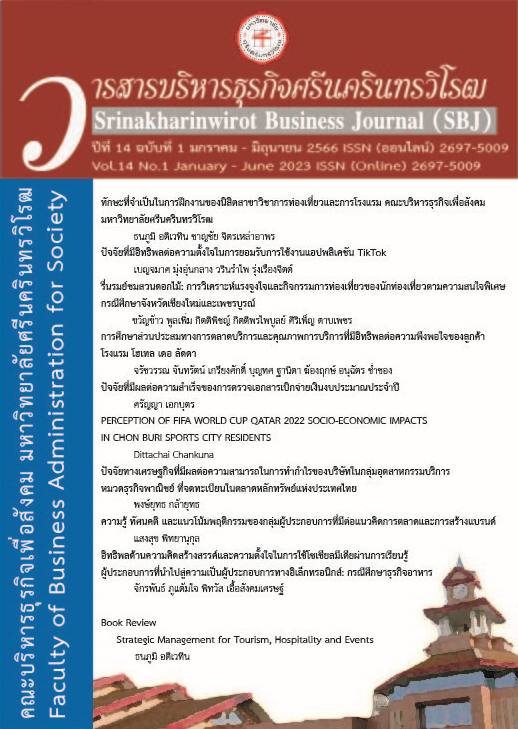REQUIRED INTERNSHIP SKILLS OF TOURISM AND HOTEL UNDERGRADUATE PROGRAM STUDENT, FACULTY OF BUSINESS ADMINISTRATION FOR SOCIETY, SRINAKHARINWIROT UNIVERSITY
ทักษะที่จำเป็นในการฝึกงานของนิสิตสาขาวิชาการท่องเที่ยวและ การโรงแรมคณะบริหารธุรกิจเพื่อสังคม มหาวิทยาลัยศรีนครินทรวิโรฒ
Keywords:
Required internship skills, Tourism and hotel, Organizational environment factorsAbstract
This study was aimed at studying 1) To study demographic factors of tourism and hotel program students influence to training practicum in tourism and hotel 2) To study organizational environment factors of tourism and hotel program students influence training practicum in tourism and hotel. By using quantitative methods, data was collected by questionnaires from 326 tourism and hotel students from the faculty of business administration, Srinakharinwirot University who enrolled training practicum in tourism and training practicum in tourism. Afterwards statistical package programs were used for data analyzing. Independent variables consisting of demographic factors and psychological environment including corporate culture, emotional engagement and job satisfaction were tested for their influences toward required skills for training practicum in tourism and hotel among tourism and hotel program students. The results revealed that followed on objectives of study: 1) Demographic factors including years of study and grade point average (GPA) have influenced to required skills for training practicum in tourism and hotel among tourism and hotel program students 2) factors of psychological environment have influenced to required skills for training practicum in tourism and hotel among tourism and hotel program students. Such results will be a useful guideline for the program to plan for applied to academic curriculum. This may apply to educational policies depend on class and career path for trainee before training experience, develop and improve teaching and learning in the future to be up-to-date with the dynamic changes of the working world.Downloads
References
กรรณิกา นาคพันธ์ แก้วสมุทร์. (2562). คุณลักษณะที่พึงประสงค์ของนักศึกษาฝึกประสบการณ์วิชาชีพ สาขาวิชาภาษาอังกฤษตามทัศนคติของแหล่งฝึกประสบการณ์. วารสารมนุษยศาสตร์และสังคมศาสตร์ มหาวิทยาลัยราชภัฏอุบลราชธานี, 10(2), 270-280. https://so01.tcithaijo.org/index.php/humanjubru/article/view/212013/157300
จริยา ตันติวราชัย และอนุชิต จันทรโรทัย. (2560). คุณลักษณะที่พึงประสงค์ของบุคลากรในอุตสาหกรรมการบริการและการท่องเที่ยว. วารสารสารสนเทศ, 16(1), 27-36. https://so03.tcithaijo.org/index.php/ oarit/article/view/105799/83914
ชลิดา ชาญวิจิตร และประสพชัย พสุนนท์. (2559). ปัจจัยที่มีอิทธิพลต่อประสิทธิภาพการปฏิบัติงานของนักศึกษาฝึกงาน กรณีศึกษา คณะวิศวกรรมศาสตร์และเทคโนโลยี สถาบันอุดมศึกษาเอกชน. วารสารปัญญาภิวัตน์, 8(2), 100-110. https://so05.tci-thaijo.org/index.php/pimjournal/article/view/65651/53647
ปรียาพร วงศ์อนุตรโรจน์. (2553). จิตวิทยาการบริหารงานบุคคล. ศูนย์สื่อเสริม.
พัชรินทร์ จึงประวัติ. (2560). คุณลักษณะที่พึงประสงค์ของนักศึกษาฝึกงานในทัศนะของผู้บริหารสถานประกอบการด้านการท่องเที่ยว. วารสารวิชาการและวิจัย มทร.พระนคร สาขามนุษยศาสตร์และสังคมศาสตร์, 2(1),11-21. https://repository.rmutp.ac.th/bitstream/handle/123456789/ 2469/IRD_61_46.pdf?sequence=1&isAllowed=y
พรพรหม แม้นนนทรัตน์ (2558). พัฒนาการการปรับปรุงรายวิชาการฝึกงานสถาปัตยกรรม ภาควิชาสถาปัตยกรรมศาสตร์ จุฬาลงกรณ์มหาวิทยาลัย. วารสารวิชาการสถาปัตยกรรม, 64(1), 105-120. https://www.arch.chula.ac.th/ejournal/files/article/111_20160106153426_PB.pdf
เมธินี วงศ์วานิช รัมภกาภรณ์ และอภิสิทธิ์ เวชชาชีวะ. (2560). ผลการฝึกงานเพื่อเสริมสร้างพฤติกรรมความมุ่งมั่นในการทำงานของนิสิตในรายวิชาฝึกงานของสาขาวิชาธุรกิจและคอมพิวเตอร์ศึกษาคณะศึกษาศาสตร์ มหาวิทยาลัยเกษตรศาสตร์. วารสารศาสตร์ปริทัศน์, 32(2), 55-64. https://so04.tcithaijo.org/index.php/eduku/article/view/97517
วีรนุช แซ่ฉิน และสุภาพร ธนะชานันท์. (2557). ปัจจัยทางจิตสังคมที่เกี่ยวข้องกับพฤติกรรมการเรียนรู้จากประสบการณ์การฝึกงานในสถานประกอบการของนักเรียนระดับประกาศนียบัตรวิชาชีพ (ปวช.) ชั้นปีที่ 3 วิทยาลัยเทคโนโลยีหมู่บ้านครู. วารสารวิชาการมหาวิทยาลัยธนบุรี, 8(17), 72-79.
https://so03.tci-thaijo.org/index.php/trujournal/article/view/56611/47102
ศิริวรรณ มุนินทรวงศ์. (2561). ปัญหาการฝึกงานและทักษะในการทำงานของนักศึกษาสาขาวิชาภาษาญี่ปุ่น มหาวิทยาลัยธรรมศาสตร์. วารสารเครือข่ายญี่ปุ่นศึกษา ฉบับพิเศษ, 8(3), 206-218. https://jsat.or.th/wp-content/uploads/2019/01/15Siriwon-Munintarawong.pdf
ศิริวรรณ มุนินทรวงศ์ และทัศนีย์ เมธาพิสิฐ (2559). ทิศทางการพัฒนาทรัพยากรบุคคลเพื่อ ผู้ประกอบการญี่ปุ่นในไทยในศตวรรษที่ 21. วารสารเครือข่ายญี่ปุ่นศึกษา, 5(2), 48-69. https://so04.tcithaijo.org/index.php/jsn/article/view/43791/36249
Ainsworth, M.D.S., Blehar, M.C., Water, E., & Wall, S. (1978). Patterns of attachment: a psychological study of the strange situation. Erlbaum.
Allen, N. J., Stanley, D. J., Williams, H., & Ross, S. J. (2007). Assessing dissimilarity relations under missing data conditions: Evidence from computer simulations. Journal of Applied Psychology, 92, 1414-1426. https://doi.org/10.1037/0021-9010.92.5.1414
Bonwell, C.C., Charles C., and James, A. E. (1991). Active learning: Creating excitement in the classroom. ERIC Digest.
Bonwell, C. C., & Eison, J. A. (1991). Active learning: Creative excitement in the classroom. ASHE-ERIC Higher Education Reports. ERIC Publications.
Bowlby, J. (1973). Attachment and loss: Volume II: Separation, anxiety and anger. Basic books.
Cooke, R. A., & Lafferty, L. J. (1989). Organizational culture inventory. Human synergistics.
Collins, N.L., & Allard, L.S. (2001). Cognitive representation of attachment: The content
and function of working models. Blackwell.
Daft, R. L. (1992). Organization theory and design. Info access.
Felder, R., & Brent, R. (1996). Navigating the bumpy road to student-centered instruction. Journal of College Teaching, 44(2), 43-47. http://www.jstor.org/stable/27558762
Harrison, R. (1972). Understanding your organization’s character. Harvard Business Review, (119-128). http://uulead.org/docs/orgcharacter.pdf
Meyers, C., & Jones, T. B. (1993). Promoting active learning: Strategies for the college classroom. Jossey-Bass.
Judge, T. A.; Locke, E. A.; Durham, C. C.; Kluger, A. N. (1998), Dispositional effects on job and life satisfaction: the role of core evaluations. Journal of Applied Psychology, 83(1), 17-34. https://doi.org/10.1037/0021-9010.83.1.17
Jusoh, M., Simun, M., & Choy Chong, S. (2011), Expectation gaps, job satisfaction, and organizational commitment of fresh graduates: Roles of graduates, higher learning institutions and employers, Education + training, 53(6), 515-530. https://doi.org/10.1108/00400911111159476
Schein, E. H. (1992). Organizational culture and leadership (2nd ed.). Jossey-Bass.
Downloads
Published
How to Cite
Issue
Section
License

This work is licensed under a Creative Commons Attribution-NonCommercial-NoDerivatives 4.0 International License.
วารสารบริหารธุรกิจศรีนครินทรวิโรฒ ยินดีรับบทความวิจัยและบทความทางวิชาการด้านบริหารธุรกิจ เพื่อพิจารณาตีพิมพ์เผยแพร่ในวารสาร ซึ่งทัศนะและข้อคิดเห็นใดๆ ในวารสารฯ ถือเป็นความคิดเห็นและความรับผิดชอบโดยตรงของผู้เขียน มิใช่เป็นความคิดเห็นและความรับผิดชอบใดๆ ของคณะบริหารธุรกิจเพื่อสังคม มหาวิทยาลัยศรีนครินทรวิโรฒ ผู้ประสงค์จะนำบทความหรือบทวิจารณ์ใดๆ ไปเผยแพร่ จะต้องได้รับการอนุญาตจากวารสารเป็นลายลักษณ์อักษร ลิขสิทธิ์บทความที่เผยแพร่ทั้งหมดเป็นของวารสารบริหารธุรกิจศรีนครินทรวิโรฒ






